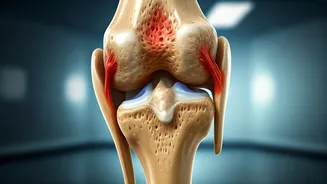Exercise Makes It Worse
One pervasive myth suggests that physical activity exacerbates arthritis pain. In reality, moderate exercise often proves beneficial. Staying active can
fortify the muscles around your joints, offering increased support and stability. It also aids in maintaining a healthy weight, consequently reducing pressure on the joints. When you remain sedentary, your muscles can weaken, potentially intensifying pain. A well-rounded exercise regimen, which includes stretching, strength training, and low-impact activities like swimming or walking, can improve joint mobility and alleviate symptoms. Always consult with a healthcare professional to tailor an exercise plan that suits your specific condition and needs. Exercise should be considered as a crucial component for managing arthritis, not a detriment to it. Remember that each body responds uniquely. Be sure to listen to your body and adjust as needed.
Only Older People Get It
While arthritis prevalence does increase with age, it's a significant misconception that only older adults are affected. Arthritis can strike individuals of all ages, including children and young adults. Several types of arthritis, like rheumatoid arthritis and lupus, can manifest early in life. Genetic predisposition, lifestyle choices, and previous injuries play crucial roles. Early diagnosis and management are vital, no matter your age. Younger people may not immediately associate joint pain or stiffness with arthritis, potentially delaying timely medical attention. Understanding that arthritis isn't an exclusive condition for the elderly can promote proactive care and prompt action in case of any symptoms. Always seek advice from a doctor, regardless of your age, if you're concerned about joint pain or other potential indicators of the condition. Taking control of your health can help you effectively mitigate its effects, no matter your age.
Arthritis Is One Disease
The term “arthritis” actually encompasses over 100 different conditions. These conditions vary greatly in their causes, symptoms, and treatments. Osteoarthritis, the most common type, stems from the gradual breakdown of joint cartilage, usually due to age or wear and tear. Rheumatoid arthritis, an autoimmune disorder, prompts the immune system to attack the joint lining. Gout results from the buildup of uric acid crystals in the joints. Each type necessitates a different approach to diagnosis and treatment. The symptoms also vary considerably. Some may cause chronic pain and inflammation, while others might involve joint deformities and systemic symptoms. Understanding that arthritis is not a single disease is crucial for accurate diagnosis and successful management. Consulting with a healthcare provider can help determine the specific type of arthritis and develop an appropriate treatment strategy.
Diet Doesn't Matter
Many people dismiss the role of diet in managing arthritis symptoms. However, what you eat can significantly influence joint inflammation and overall health. Some foods can trigger inflammation, making symptoms worse. Conversely, other foods possess anti-inflammatory properties that can help relieve pain and improve joint function. A diet rich in fruits, vegetables, and omega-3 fatty acids, commonly found in fish, can have a positive impact. Processed foods, sugary drinks, and excessive red meat may exacerbate inflammation. Moreover, maintaining a healthy weight is vital. Excess weight puts additional strain on joints. A balanced diet aids in maintaining a healthy weight. Consulting a registered dietitian can provide personalized guidance on how to adjust your diet to support arthritis management. This is a very important step to ensuring you are taking control of your health.
All Arthritis Is the Same
This myth is related to the misconception that arthritis is a single disease. As mentioned before, there are over 100 different types of arthritis, each with its own unique characteristics. Symptoms, progression, and treatment approaches will vary significantly among different types. For instance, osteoarthritis primarily affects cartilage, while rheumatoid arthritis impacts the joint lining. Some forms of arthritis might develop quickly, while others advance more gradually. Treatment strategies will be tailored to the specific type. Medicines, physical therapy, and lifestyle adjustments will vary. It's imperative that you receive an accurate diagnosis to ensure the most effective treatment plan. Rely on a doctor to guide you through your condition. Self-treating or making assumptions about your specific type of arthritis can be detrimental to your health.
There's No Treatment
Despite the absence of a cure for most forms of arthritis, numerous effective treatments exist to manage symptoms and improve quality of life. The treatments can vary widely. Medications, including pain relievers, anti-inflammatory drugs, and disease-modifying antirheumatic drugs (DMARDs), are commonly used. Physical therapy, which can include exercises and modalities like heat or cold therapy, helps to improve joint function and reduce pain. Lifestyle adjustments, like weight management and exercise, play crucial roles. In some instances, surgery might be necessary. The specific treatment approach depends on the type and severity of arthritis, as well as the individual's overall health and personal preferences. Early diagnosis and proactive management are crucial. Working with your healthcare team to develop a comprehensive treatment plan can significantly alleviate symptoms. Staying informed and consulting with medical experts can help you manage the condition effectively.
Supplements Are Useless
While not a cure, certain supplements can help manage arthritis symptoms. Glucosamine and chondroitin are popular supplements that some individuals find helpful. They are believed to support cartilage health and reduce joint pain. Omega-3 fatty acids, found in fish oil, have anti-inflammatory properties that can reduce pain and stiffness. Some people also take turmeric, which contains curcumin, a compound that may have anti-inflammatory effects. It's important to remember that supplements aren't regulated in the same way as medications. The effectiveness varies from person to person. Before taking any supplement, you should always consult with your doctor. They can advise you. They can also ensure that the supplement doesn't interact with any other medications or cause any adverse effects. You should always combine supplements with a well-rounded treatment plan.
Surgery Is Always Needed
Surgery is not the only option for all people with arthritis. Though it can be a highly effective treatment in some cases, it's typically considered after other treatments have failed to provide adequate relief. Options such as joint replacement may be appropriate for some forms of arthritis, particularly osteoarthritis, when joint damage is severe. The decision to undergo surgery should be made in consultation with your healthcare provider. Factors such as the severity of your symptoms, the impact on your daily life, and the overall health of the joint are considered. In some instances, less invasive procedures, such as arthroscopy, may be performed to repair or remove damaged tissue. Many people can manage their arthritis with non-surgical treatments like medication, physical therapy, and lifestyle changes. Always discuss all treatment options with your doctor. Make sure you fully understand the risks and benefits before making any decisions.
Arthritis Is Untreatable
This is a widespread misconception, which is untrue. While there is no cure for many types of arthritis, a wide range of treatments can effectively manage symptoms, slow disease progression, and improve quality of life. These treatments vary based on the specific type of arthritis and the severity of the condition. They can include medications, physical therapy, lifestyle changes, and, in some cases, surgery. The goals of treatment are to reduce pain and inflammation, preserve joint function, and prevent further damage. Advances in medical research have led to the development of new and more effective treatments. Early diagnosis and proactive management are very important. People can live full and active lives with appropriate care. Work closely with your healthcare team to develop a personalized treatment plan.
Weather Affects Arthritis
Many people with arthritis report that their symptoms worsen during changes in weather. However, the scientific evidence supporting this claim is mixed. Some studies have suggested a connection, but others haven't found a definitive link. Changes in barometric pressure, temperature, and humidity might influence joint pain. It is possible that changes affect inflammation in joints. While the weather may trigger changes, many other factors contribute to arthritis symptoms. The experience of individuals varies. Some report increased pain and stiffness in cold, damp conditions, while others experience more discomfort in hot, humid weather. If you notice a correlation between weather changes and your symptoms, you can take steps to manage your pain. Staying warm, exercising, and maintaining a healthy lifestyle can help. Consulting with your healthcare provider can help you create a plan to manage the effects of any weather changes.















